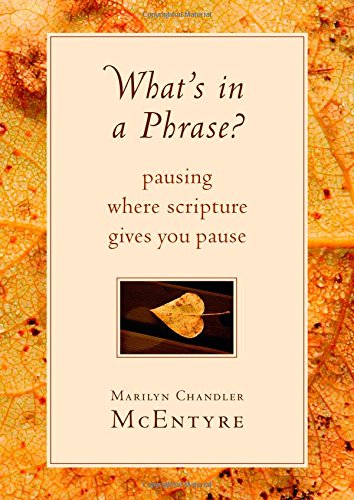Wednesdays with Words: Civilizing Aunts and Domestic Duties

I’ve been trying to put the phone down more and pick up miscellaneous books more. Including the one that resides in the Master Bath.
I really like Marilyn Chandler McEntyre’s writing. I loved her Caring for Words in a Culture of Lies and have been rarely reading What’s in a Phrase? Every time I pick it up, I think I should do so more.
Last week I read her meditation on Ezekiel 5:12 “A third part of you … I will scatter to all the winds …”

But the ways in which we need each other are often obscured for those of us who live in a culture where mobility is expected and required for many jobs, individualism is elevated to an ethic, and independence is presumed to be a core value in early childhood training. American national mythology glorifies the loner who “lights out for the territory,” rejecting the constraints of civilizing aunts and domestic duties. … Anonymity is not only inevitable; it has become, for many of us, normative. We don’t expect — or even want — to be recognized in the middle of the city, and so our sense of accountability shrinks. We are a scattered people.
After this diagnosis, she goes on to contemplate, if not a panacea, a cure for those who recognize the suffering:
Gathering, therefore — building and fostering community — requires prayerful attention. Ultimately, real community is a gift from the Spirit who directs our ways, but sustaining community is a sacred, human, often demanding task. To gather — for worship or prayer, or around a bereaved family, or in a hospital room, or where free lunches are served to the homeless — we have to lay aside the personal occupations that keep us closely focused on our own homes, traveling our daily routes, caring for our nuclear families.
Building community online is good. I’ve been encouraged and loved and grown through those relationships. Building community in person. Living in someone’s life is better. I was reminded of this while I listened to Mystie discuss her Elementary Lessons with Pam. That she and her friend are able to work together because they live their lives together already. Their children live together. They play together. They are in a position for reproof and exhortation related to the day-to-day living of which homeschooling is just a part.
Who do you live with? How do you build community together with others? How do we take “me and my household” to build up the body rather than insulate against it?
‘);
